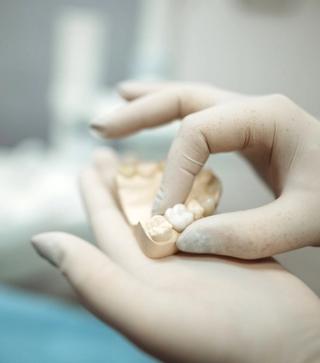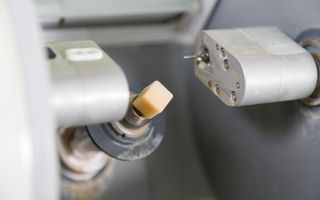
A dental crown is a custom-made cover that fits over your existing tooth, providing strength and protection while enhancing its appearance.
With years of combined experience, our team at National Dental Care Algester is knowledgeable in dental crowns and committed to providing comprehensive care. If you're considering improving your smile, get in touch with our friendly team.
What is a dental crown?
Dental crowns are a great way to repair a compromised or damaged tooth, and they have several benefits for your oral health. In fact, a crown can make the difference between preserving a natural tooth and having it extracted.
A dental crown is like a thin shell that fits over your natural tooth. It is made especially for your teeth so you won’t feel any real difference - and because it looks completely natural, no one will even know it’s there.
Dental crowns are usually made from porcelain, which is a very strong material that can be matched to your natural tooth colour. However, you can also choose a dental crown made from gold, which doesn’t have the same natural look, but does offer added strength. That’s why gold is usually used for back teeth that can’t be seen when you smile, but do more of the heaving lifting when it comes to chewing.

A dental crown is usually required when your natural tooth is weakened, broken or damaged in some way. For example, many people who have a root canal treatment will get a dental crown placed over the tooth for added strength.
A dental crown can also improve the appearance of stained or misshapen teeth. For example, if a tooth is discoloured, a dental crown can be fitted over the natural tooth for a whiter smile if standard teeth whitening is not sufficient.
Advantages of a dental crown
A crown is an excellent solution to several problems and offers a variety of advantages.
- Protect a weak or damaged tooth: The key advantage of a dental crown is that it strengthens your tooth, avoiding further damage or issues that could arise due to a weakened tooth.
- Improved appearance: Dental crowns can cover misshapen or discoloured teeth for a brighter, whiter smile.
- Long lasting: With the right care, a dental crown is a long-lasting solution that you can forget about after you get it.
Same-day crowns with CEREC
Experience the convenience of our advanced CEREC technology at National Dental Care Algester, letting you get your dental crown in just one visit!
CEREC is a fantastic choice for fixing damaged or decayed teeth and improving the function and appearance of your natural teeth. Plus, it’s a hassle-free solution that allows you to have your new crown made and fitted on the day of your appointment - making it ideal for busy lifestyles.

What to expect from a dental crown appointment
Wondering what’s involved in a dental crown treatment? Here’s a step-by-step overview of the procedure:
- Preparation: Prior to your appointment, it's advisable to have a meal and drink to ensure your comfort.
- Oral Hygiene: Maintain excellent oral hygiene by brushing and flossing your teeth before the procedure.
- Anaesthesia: Your dentist will administer a local anaesthetic to numb the treated area, ensuring your comfort throughout.
- Tooth Preparation: A thin layer of your tooth will be carefully removed, shaping it to accommodate the dental crown.
- Impression: A precise mould of your prepared tooth will be taken to ensure an accurate fit for the crown.
- Temporary Crown: A temporary crown will be attached and adjusted to align with your bite for interim use.
- Discomfort: While the procedure may induce some discomfort, it should not be painful. You can raise your hand at any time if you need a short break.
- Numbness: Expect the area to remain numb for several hours following the procedure.
- Post-Procedure Tenderness: It's normal for the treated area to feel tender for a day or two after the procedure.
- Final Appointment: During the second appointment, your dentist will remove the temporary crown and evaluate the fit of the permanent crown.
- Permanent Crown Attachment: The permanent dental crown will be fixed using dental cement, and its shape will be refined to ensure it properly aligns with your bite.
Dental crowns can make for a more beautiful and attractive smile. Book a consultation today to discover the advantages of dental crowns and begin your journey towards a healthy smile.
Frequently asked questions
The cost of a dental crown will vary depending on which tooth or teeth are involved and your private health insurance.
During your initial consultation at National Dental Care Algester, our experienced dental professionals will evaluate your specific needs and provide you with a personalised treatment plan along with an accurate cost estimate.
Health Funds: At National Dental Care Algester, we accept all major health fund providers. Plus, our HICAPS facilities allow you to claim your rebate on the spot after your treatment – there’s no waiting around.
We are also a preferred provider for many health funds - so if you’re with one of our preferred provider funds, you can use your dental extras and minimise out-of-pocket expenses. We're here to help you make the most of your dental benefits.
Payment Plans: Our payment plans, SmileFund and Afterpay, provide a flexible, interest-free payment option, ensuring you receive the care you need without worrying about the cost.
SmileFund is our exclusive payment plan that provides interest-free payments for unexpected or unplanned treatments for up to 18 months. If you use Afterpay, you can split your treatment cost into four equal, interest-free instalments over a few weeks.
Crowns are usually suitable for teeth that have been heavily restored with previous fillings, or for teeth that have severe decay. The most common reason a crown fails is not the crown itself, but the tooth underneath.
If the crown does fail, you can often have it replaced. There is no set time to replace crowns - and with good oral hygiene and regular check-ups, a crown can typically last for many years.
Proper care - including regular brushing, flossing, and dental check-ups at National Dental Care Algester - can help your dental crown to last as long as possible.
No, getting a dental crown is not painful, as your dentist will give you a local anaesthetic to numb the area.
It may be uncomfortable to sit in the chair with your mouth open during treatment, but you can put your hand up for a break at any time. Also, our team of caring professionals will help to ensure your comfort throughout the entire process.
Not all teeth that receive a dental crown require a root canal procedure. Root canal treatment is typically necessary when the tooth has extensive decay or infection that has reached the pulp, causing pain or abscess.
During your initial examination at National Dental Care Algester, our experienced dentists will evaluate the condition of your tooth and recommend the best treatment, whether it involves a root canal or not.
Yes. A dental crown can greatly improve the strength, health, and appearance of your natural tooth. It’s a good solution for a number of issues, so be sure to discuss getting a crown with your dentist. They may be able to offer alternative solutions such as dental veneers, or explain why a crown is the best option for your needs.
Getting a dental crown is a routine and safe procedure. Some typical side effects include temporary tenderness around the treated area, which usually subsides within a day and can be managed with over-the-counter pain relief.
There is also a chance of discomfort when the anaesthesia wears off. If this happens, it's best to contact your dentist, as adjustments to the crown may be necessary. While not common, it's important to be aware of this possibility.
With proper care, the risk of your dental crown chipping, breaking, or dislodging over time is minimal. In case this occurs due to regular wear and tear, your dentist can either repair and reattach the crown or create a new one.

